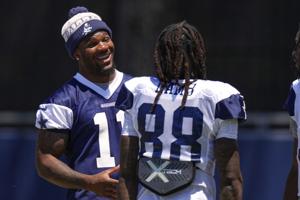The Dallas Cowboys face mounting pressure to resolve the contract dispute involving star linebacker Micah Parsons before the 2023 NFL season begins. As the season approaches, Parsons’ situation echoes previous contract negotiations involving key players, notably Dak Prescott, who had to play under a franchise tag in 2020.
Parsons, who has quickly established himself as one of the league’s premier defensive talents, is seeking a new deal that reflects his contributions to the team. His performance in the previous seasons has garnered attention and praise, positioning him as a cornerstone for the Cowboys’ defense.
The Dallas Cowboys owner, Jerry Jones, has a history of lengthy contract negotiations, which often create unease among players and fans alike. This situation is no different, as Parsons’ contract remains unresolved, sparking concerns over the potential impact on team dynamics and performance.
Historical Context of Cowboys’ Contract Negotiations
In recent years, the Cowboys have navigated several high-profile contract discussions. Prescott’s experience with the franchise tag highlighted the challenges players face when negotiations stall. Following a protracted back-and-forth, Prescott eventually secured a four-year contract worth $160 million in March 2021, but not without significant stress for both the player and the organization.
Parsons’ case is particularly pressing given the expectations for the upcoming season. As one of the key defensive players, his absence or dissatisfaction can have far-reaching effects on the Cowboys’ performance. The organization must weigh the urgency of securing Parsons’ commitment against the complexities of negotiating a lucrative and fair contract.
Jones has publicly stated his commitment to keeping star players within the organization, emphasizing the importance of a strong roster. Yet, the clock is ticking as training camp approaches, and the pressure is mounting to finalize a deal that satisfies both Parsons and the Cowboys.
The Financial Implications
The financial ramifications of Parsons’ contract negotiation are significant. As a rising star, Parsons is expected to command a substantial salary—potentially exceeding $20 million per year. This figure aligns with the contracts of other top defenders in the league, reflecting the market value for elite talent.
Failure to reach an agreement could lead to various consequences, including potential distractions during training camp and the regular season. The Cowboys must be mindful of maintaining team morale and focus while navigating these negotiations.
In addition, a prolonged dispute could affect Parsons’ performance on the field. Players often feel the weight of contract negotiations, which can lead to diminished focus and effectiveness during games. The Cowboys are aware that keeping their star players engaged and committed is vital for their success.
As the Cowboys work to secure a contract with Parsons, the urgency of the situation cannot be overstated. With the start of the season on the horizon, quick action is essential for both parties to ensure a smooth transition into the competitive landscape of the NFL.
In conclusion, the Dallas Cowboys need to act swiftly to resolve Micah Parsons’ contract dispute. Given the historical context of contract negotiations within the franchise and the financial implications at play, both the organization and the player must find common ground to ensure a successful season ahead.
